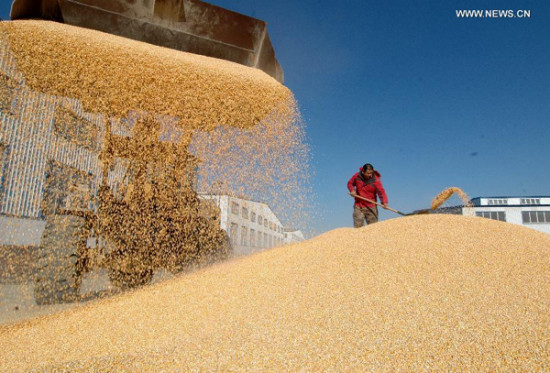
An employee of the Qilihe National Grain Depot airs corn in Yixian county, Jinzhou city, Northeast China's Liaoning province, Nov 13, 2014. (Photo/Xinhua)
Sinograin storage managers in Liaoning and Jilin provinces have been embezzling public funds by paying grain merchants the price of freshly harvested grain for old grain.
An undercover footage aired by China Central Television shed light on the taboo topic of corruption in the grain storage State-owned Enterprise (SOE), revealing that agricultural reserves held in bulging government warehouses may have badly degraded.
In the report, entitled Rats in the Granary, a chief manager at a state grain warehouse in Northeast China's Jilin province allowed his brother to put grain harvested in 2011, which he bought for 2.84 yuan per kilogram, into storage, while filing paperwork to show they were buying new grain at the state-set minimum price of 3.1 yuan per kilogram.
More than 10,000 yuan ($ 1,613) was embezzled from the sale of 47 tons of grain due to the price gap. The new paperwork showed the grain as being harvested in 2014.
In the report, a rice processing company manager surnamed Zhao said she bought more than 23,000 tons of grain from the same Liaoning grain storage last year, and the supposedly freshly-harvested grain had changed color and smelled of mildew.
She said in her ten years of working in this field, the phenomenon of SOEs selling old grain as new is common. Buyers who complained usually agreed to officials' offers to "solve it personally", or receive a small compensation.
The Chinese government guarantees a minimum price for the purchase of agricultural products by state owned storages, in case the market price is low, in order to protect farmers.
But in the CCTV report, Jilin farmers living just two kilometers away from a grain storage could only sell their grain to private merchants at discounted prices. "The storage only accepts products from people who have 'guanxi', or connections," said a farmer in the footage.
The story has come under the national spotlight and aroused a whirl of public discussion. Beijing News said in a comment, "Currently the industry is monopolized by Sinograin, which operates in a black box without any external supervision. Why not learn from developed countries and allow non-SOEs, social organizations, even farmers, to store surplus grain, and purchase the grain from them when needed? That will break the monopoly and nip corruption at the root."
CCTV News commented, "There have long been reports about corruption involving Sinograin, but they have never been seriously dealt with. Had the recent cases in Liaoning and Jilin not been reported, Sinograin might have continued resisting an anti-graft probe. Under high pressure, the Sinograin authorities have finally agreed to a probe and we expect disciplinary agencies to get involved and make everything clear."
The story also has drawn attention from foreign media. The Financial Times speculated,"If the stockpiles include large amounts of unusable grain, China could be forced to increase imports sharply, causing international prices to jump. However, if the reserves are of good quality, then Beijing's efforts to draw down its stockpiles by dumping them on the market would push prices down."
China's minimum purchase prices have faced criticism for their rigidity, and because they remained above world price levels in the past four years, have prompted more imports of products such as soybeans, barley and sorghum from the Brazil, Argentina and the US in 2014.
Since February 2014, China started a trial of a target price system for agricultural products. The new system is expected to allow the market to play a key role in the pricing of agricultural products.
Under this system, which applies to pork, fertilizer, cotton, vegetable oil, sugar and other items, lower-income households will receive subsidies when prices are high, while farmers will receive subsidies when prices fall too low.
In April 2014, a trial for this target price system was initiated for cotton farmers in Xinjiang.
















































